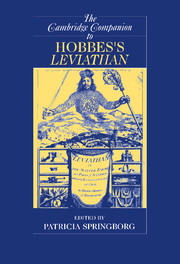General Introduction
Published online by Cambridge University Press: 28 November 2007
Summary
Hobbes's Leviathan is arguably the most brilliant and influential political treatise ever written in English, and it certainly stands as the first major work of English political philosophy embedded in an encyclopaedic corpus. But it has long awaited an authoritative English critical edition and was until recently rarely read in its entirety. Even in Germany, where pioneering bibliographical work on Hobbes's texts was undertaken by Ferdinand Tönnies, an important political theorist in his own right, Hobbes was mostly read in an abridged edition that omitted the last two books, which comprise more than half the length of the original work. These two books, 'Of a Christian Commonwealth' and 'Of the Kingdom of Darkness', are important sources for Hobbes's theology, and were very controversial in his day. Recent critical debate suggests that they are now again controversial.
In Leviathan Hobbes gave institutional sanction to the principle on which the great schism created by the Protestant Reformation was decided: cuius regio eius religio; it was up to the godly prince to decide religious orthodoxy. On this principle, the peace of Westphalia of 1648, which closed half a century of religious wars and marked the creation of the modern international system of states, was founded. Sect and schism are persistent topoi of Hobbes's works, beginning with his 1645 debate with Bishop Bramhall in Paris, conducted under the auspices of the Earl of Newcastle but published only in 1654, and dominating his works of the 1660s, written when Hobbes was himself under threat of indictment for blasphemy and possible heresy.
- Type
- Chapter
- Information
- The Cambridge Companion to Hobbes's Leviathan , pp. 1 - 26Publisher: Cambridge University PressPrint publication year: 2007

